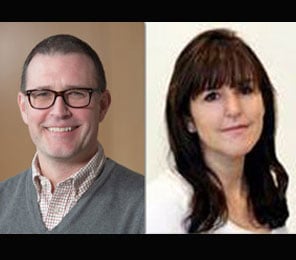 |
|
| Pictured above Eric Mick, MD, ScD, associate professor of quantitative health sciences, and Jane Freedman, MD, professor of medicine. |
One of the basic tenants of the School of Medicine’s Learner-Centered Integrated Curriculum (LInC) is combining foundational basic science and clinical education throughout all four year of medical school. The final new LInC course brings this model full circle, requiring fourth-year students in the month before Match Day to take the insight they’ve learned in their clinical rotations back to a course where they will study the molecular, cellular and genetic basis of disease.
The timing of this two-week intensive course is key to preparing students for the real world of medicine, said Jane Freedman, MD, professor of medicine, co-leader for the course, Advanced Biomedical and Translational Sciences.
“As one of the last courses before graduation, this reminds them of the importance of being lifelong learners,” said Dr. Freedman. “Science is growing and evolving very fast, and it will continue to do so. We want our students to recognize that what they’ve learned about basic science is not just a collection of facts. They will need a fluid approach to apply science to the treatment of patients throughout their careers.”
Each student will select a specific area of study from a list of 10 to 12 topics, such as genetics, cancer, auto-immune disease or cardiovascular disease. Groups of no more than 12 students will work with a basic or clinical scientist to build expertise in the selected area, examine a specific question and apply their findings into understanding disease.
“The process is as important as the substance,” said Eric Mick, MD, ScD, associate professor of quantitative health sciences, and the other co-leader of the course. “But it also gives students the chance to really dig deep into a subject they are interested in.”
The opportunity to tap into reservoir of interesting research happening in Medical School labs, as well as the enthusiasm of PhDs and other scientists—some of whom have little interaction with medical students—talking about their work and its relevance to human disease is another exciting aspect of the course.
“The PhD/MD interaction is a real asset to the course,” Freedman said. “Each section will be tailored to the students’ interests and the faculty member’s expertise.”
Since the course won’t be offered for the first time until 2014, the specific faculty members participating and the topics offered are still evolving. One example might be a student interested in the biology of addiction who investigates addiction receptors to create a model for a new drug, or develop a proposal for a clinical trial.
The pair anticipates refining the course through feedback from both faculty and students. “There is no other model for this course anywhere,” said Freedman.
Related links on UMassMedNow:
Approval of fourth-year curriculum marks a milestone
Year three of new curriculum has clinical care at its core
Second year of new medical school curriculum approved
A new way of teaching medicine begins with School of Medicine’s entering class
Inaugural class of Learning Community Mentors named